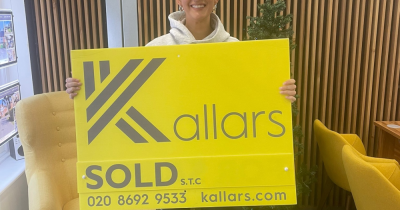Interior design trends change year on year, much like fashion trends. Taking inspiration from all different cultures from all over the world. Looking at trends from years gone by to create our spaces. What are the new emerging trends for our homes for 2023?
As each year ends, we reflect on the year before and set resolutions and goals for the year ahead. Here is what you need to know if a house move is on the cards for you in 2023.
Have you ever missed out on your dream property because an agent didn't call you and give you a heads up? Sign up to our Heads Up property alerts and never miss out again!
This week Craig Cassidy and Thomas Izod proudly represented Kallars and visited Demelza Hospice Care for Children to make a £2,500 donation for Christmas!
Congratulations to this very happy buyer who has completed on her brand new flat in Dartford! 🔑🏡
We are over the moon to have been awarded the 2022 Gold award for Best Lettings Branch and Best Sales Branch in SE8 from allAgents 🏆🏆
Take a look at our 2022 review for our London Sales office Rightmove performance!
It's highly likely that you or someone in your family has had to work from home at some point in the last few years. Most bosses have realised that, without the chit-chat and distractions of the office environment, productivity is actually higher. But it isn't practical for you to work from the end of the kitchen table permanently.
We all do it. Every year we overfill our schedule in the run-up to Christmas. Children's school commitments, staff parties, gift shopping - there's just so much to do. If you are considering moving house, there is a strong chance that it is not a particularly urgent move, and you will push this to the AFTER Christmas category.
Nativity plays, shopping, present wrapping, and staff parties. It's all go in the run-up to Christmas. There is so much going on at this time of year. Preparing for viewings on your property, on top of everything else, could be enough to send you over the edge!
If you're trying to sell your home, you might wonder what to do around Christmas time. Should you take it off the market for a month or so? Or try to juggle the viewing appointments around your other commitments?
As the clocks change and the darkness comes earlier each night, many pet owners begin to feel anxious about the fireworks at the start of November. Read these top tips to keep your pets calm and happy.











